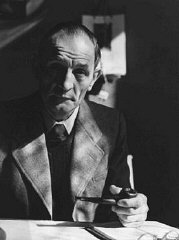Statement by the President on International Holocaust Remembrance Day“It is with a heavy heart and somber mind that we remember and honor the victims, survivors, heroes of the Holocaust. It is impossible to fully fathom the depravity and horror inflicted on innocent people by Nazi terror.“Yet, we know that in the darkest hours of humanity, light shines the brightest. As we remember those who died, we are deeply grateful to those who risked their lives to save the innocent.“In the name of the perished, I pledge to do everything in my power throughout my Presidency, and my life, to ensure that the forces of evil never again defeat the powers of good. Together, we will make love and tolerance prevalent throughout the world.”The Statement of the White House omn International Holocaust Day was unquestionable the greatest boost ever to the Holocaust deniers Brigae ever in Social Media . Jared and Ivanka Kushner should be ashamed of #OyVeyDonaldTrump . #AmericaHangsItsHeadInShame
Martin Niemöller, a prominent Protestant pastor who opposed the Nazi regime. He spent the last seven years of Nazi rule in concentration camps. Germany, 1937.
— Bildarchiv Preussischer Kulturbesitz

Martin Niemöller (1892–1984) was a prominent Protestant pastor who emerged as an outspoken public foe of Adolf Hitler and spent the last seven years of Nazi rule in concentration camps.
Niemöller is perhaps best remembered for the quotation:
First they came for the Socialists, and I did not speak out—
Because I was not a Socialist.
Then they came for the Trade Unionists, and I did not speak out—
Because I was not a Trade Unionist.
Then they came for the Jews, and I did not speak out—
Because I was not a Jew.
Then they came for me—and there was no one left to speak for me.
The quotation stems from Niemöller's lectures during the early postwar period. Different versions of the quotation exist. These can be attributed to the fact that Niemöller spoke extemporaneously and in a number of settings. Much controversy surrounds the content of the poem as it has been printed in varying forms, referring to diverse groups such as Catholics, Jehovah's Witnesses, Jews, Trade Unionists, or Communists depending upon the version. Nonetheless his point was that Germans—in particular, he believed, the leaders of the Protestant churches—had been complicit through their silence in the Nazi imprisonment, persecution, and murder of millions of people.
Only in 1963, in a West German television interview, did Niemöller acknowledge and make a statement of regret about his own antisemitism (see Gerlach, 2000, p. 47). Nonetheless, Martin Niemöller was one of the earliest Germans to talk publicly about broader complicity in the Holocaust and guilt for what had happened to the Jews. In his book Über die deutsche Schuld, Not und Hoffnung (published in English as Of Guilt and Hope)—which appeared in January 1946—Niemöller wrote: "Thus, whenever I chance to meet a Jew known to me before, then, as a Christian, I cannot but tell him: 'Dear Friend, I stand in front of you, but we can not get together, for there is guilt between us. I have sinned and my people has sinned against thy people and against thyself.'"
Further Reading
James Bentley, Martin Niemöller: 1892–1984 (NY: Macmillan Free Press, 1984).
Victoria Barnett, For the Soul of the People: Protestant Protest Against Hitler (NY: Oxford University Press, 1992).
Wolfgang Gerlach, And the Witnesses were Silent: The Confessing Church and the Jews (Lincoln, Nebraska: University of Nebraska Press, 2000).
No comments:
Post a Comment